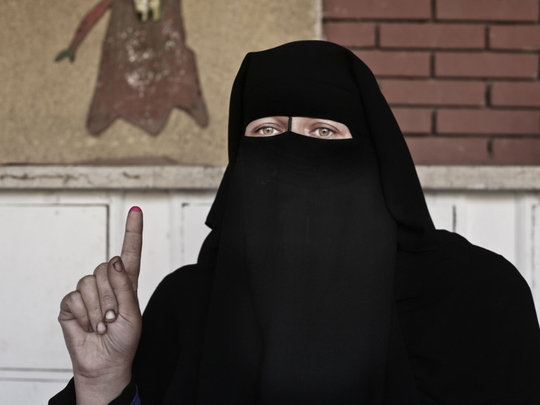
Cairo: All appearances point to a fierce rivalry among more than 40 contenders eyeing parliament in the Islamist district of Al Mataria in northern Cairo.
Posters of the contestants are pasted on buildings in this working-class district of around 650,000 people. Streets are also festooned with colourful banners promoting different candidates.
In theory, one contender is from the Salafist Al Nour Party, the only Islamist force running in the two-stage parliamentary election. In practice, one can hardly see a poster of the candidate named Mohammad Muneer.
A closer look will, however, show that there were posters of the man, but have been torn apart in what the party claims is a systematic nationwide campaign by secularists targeting it.
Al Nour performed badly in last month’s first round of the election, securing only 10 out of a total of 273 seats at stake. The result far pales in comparison to Al Nour’s strong performance in the 2011-2012 parliamentary vote when it gained 25 per cent of the legislature, coming second to the Muslim Brotherhood.
The Islamist-dominated legislature was elected months after an uprising forced long-time president Husni Mubarak to step down, but it was dissolved later by the country’s Constitutional Court.
Some voters say they have lost confidence in Islamists due to the turbulent one-year rule of president Mohammad Mursi of the Brotherhood, toppled by the army in 2013 following enormous streets against him.
“Those people are mere merchants of religion,” said Mahmoud Abdul Ghafur after voting in a highly guarded polling station in Al Mataria. “What did we gain from the Brotherhood? They were arrogant and tried to make us slaves in the name of Islam, which is innocent from them,” added the 45-year-old shop owner.
Since Mursi’s overthrow, Al Mataria has often seen bloody clashes between the Brotherhood loyalists and security forces. The Brotherhood is now outlawed in Egypt where it is also listed as a terrorist organisation.
“Over the past weeks, the Ikhwan (Brotherhood) supporters tried to mar the situation in the run-up to the election by shredding candidates’ banners and instigating people to boycott the balloting,” said Sadeq Fayez, a 49-year-old government employee. “But their efforts have failed. There is no place either for the Ikhwan or Al Nour, who acts as a cloak for them.”
In recent months, Al Nour has come under heavy criticism from secularists and pro-government media, accusing it of being a proxy for the Brotherhood and an umbrella for militants.
The party has denied the accusations, saying the campaign is aimed at harming its image in the public eye.
“It does not underestimate the status of a party if it suffers losses in elections, provided this is the result of a fair competition, which has not happened during the current polls,” said Alaa Bakr, a member of Al Nour.
“All political powers have been unified in assailing our party before and during the election process despite its patriotic stances,” he added.
Al Nour was the only Islamist force that endorsed Mursi’s ouster, a matter that has antagonised other Islamists.
“We are now the only representative of the Islamist current. Our participation in political life has helped expose claims by the Brotherhood that their conflict with the present regime is pursued in the name of Islam,” said Bakr.
Other Islamists, including the Brotherhood, have urged their supporters to boycott the polls, calling them a sham.
Bakr also blamed the electoral system for Al Nour’s balloting losses. “The government insisted on holding the elections on the basis of a defective system weakening political parties.”
Eighty per cent of the elected 568 parliamentary seats are designated for individual candidates and the remaining 20 per cent are reserved for political parties based on the winner-takes-all absolute list system.
This set-up gives the party list, which wins at least 51 per cent of the vote in any electoral district, all the seats there.
“This absolute list system wastes votes,” said Bakr. “For example, Al Nour’s list in the West Delta Constituency in the first round gained one third of the overall votes cast there. This would have guaranteed the party one third of the seats in the constituency if the proportional representation system had been adopted.”
The pro-Sissi bloc, for Love of Egypt, won all the 60 seats allocated for party-based slates in the first round. This alliance of secular parties and businessmen are expected to win all the 60 seats reserved for political parties in the second and final round, which began Sunday and runs for two days.
According to Omar Hashem, an expert at the state-run Al Ahram Centre for Political Studies, Al Nour is unlikely to win more than 10 out of the 282 seats up for grabs in the second round.
“The party is paying the price for the Brotherhood rule, ensuing violence and the fierce attacks unleashed against it [Al Nour] in recent months,” Hashem said.
“However, it is impossible to imagine the new parliament without Islamists. Even in the days of Mubarak, the Islamist current had its representatives, even if their number was very few.”












